Key takeaways:
- Sustainable shopping involves making mindful choices that benefit the environment and society, such as choosing reusable bags and supporting local businesses.
- Opting for sustainable products often leads to better quality and impacts labor practices positively, encouraging brands to adapt to consumer demand for eco-friendly options.
- Supporting local items reduces carbon footprints, strengthens local economies, and creates a more rewarding shopping experience.
- Practicing responsible shopping includes making lists, supporting local vendors, and researching brands to align purchases with personal values.
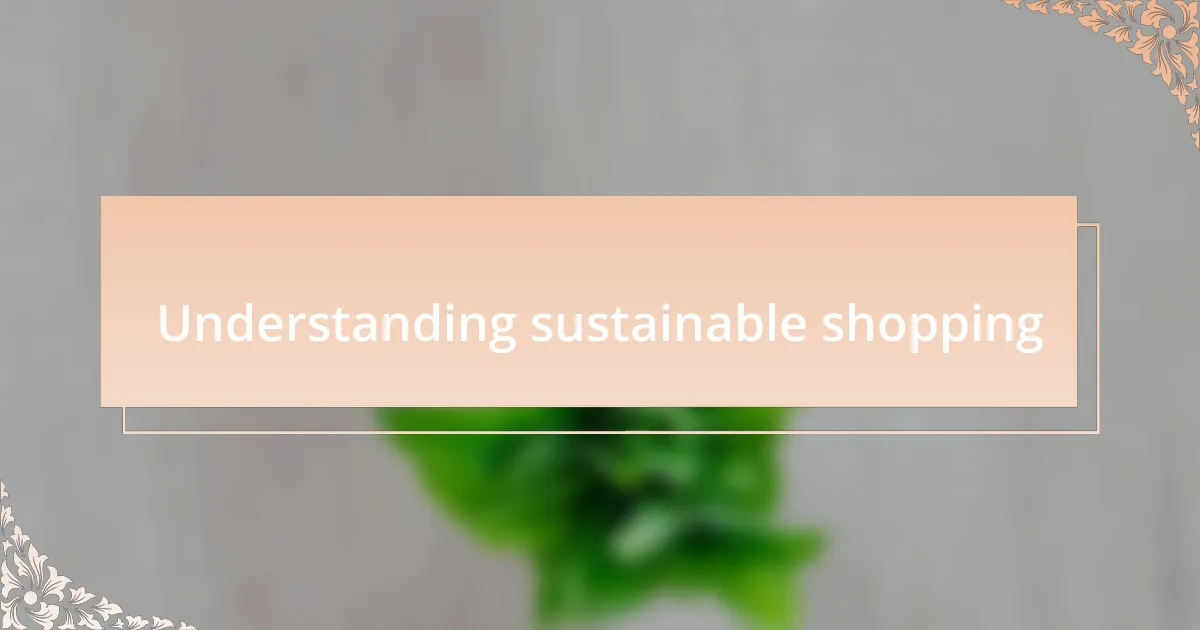
Understanding sustainable shopping
Sustainable shopping is about making choices that positively impact the environment and society. When I started to explore this concept, I realized how small decisions, like choosing reusable bags over plastic ones, can ripple out into greater change. Have you ever thought about the weight of your purchases and their environmental footprint?
Understanding sustainable shopping also means considering the lifecycle of products. I once bought a beautifully crafted wooden kitchen utensil, and it made me reflect on the resources required to create it. Each item we choose not only serves a purpose but also tells a story – a story of sourcing, manufacturing, and ultimately, disposal.
Moreover, supporting local artisans and businesses feels like a tangible way to contribute to sustainability. I remember visiting a farmers’ market and discovering produce that was not only fresher but also grown using eco-friendly practices. How rewarding it is to know that with every purchase, we can help build community resilience and reduce carbon footprints!
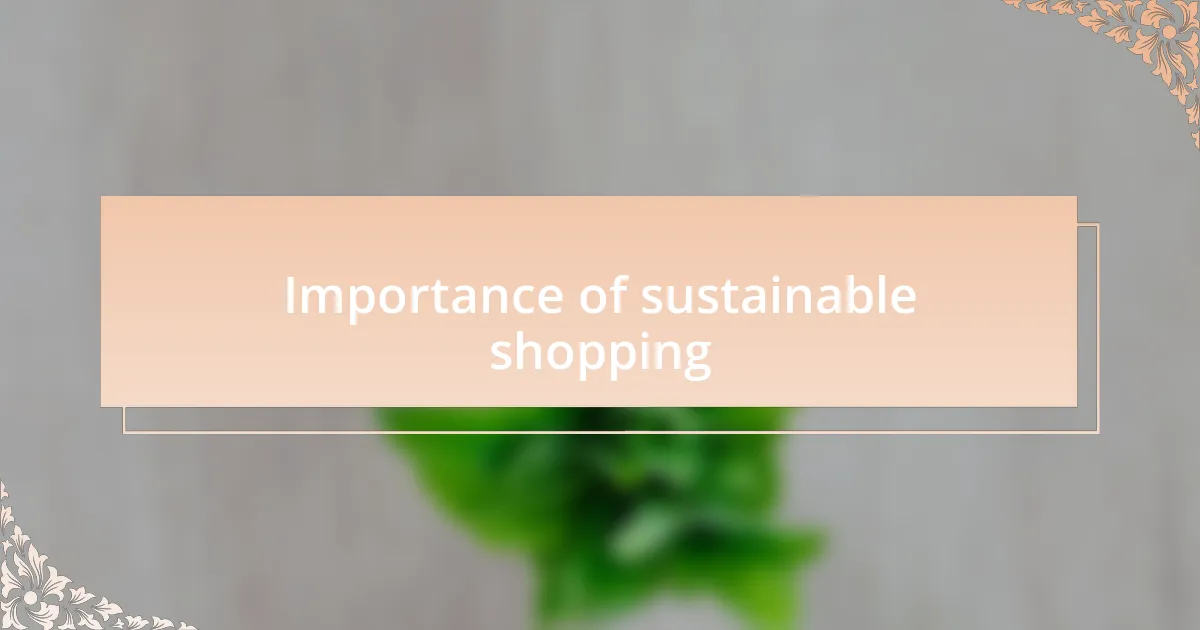
Importance of sustainable shopping
Sustainable shopping isn’t just a trend; it reflects a mindset that prioritizes the planet’s health and future. I remember the first time I consciously chose organic, local fruits over conventional ones at the grocery store. It felt like I was not just supporting better farming practices but also investing in my own health. Isn’t it fascinating how our choices can intertwine the well-being of our communities and our personal wellness?
Choosing sustainable products often translates to greater quality and longevity. I encountered this firsthand when I invested in a fair-trade coffee maker that not only steeped excellent brew but also supported ethical labor practices. Each morning ritual became a moment of pride, knowing I was making a mindful choice rather than contributing to exploitation. Have you ever thought about how each dollar spent can echo beyond mere consumption?
Moreover, the importance of sustainable shopping extends into fostering innovation and change within industries. When consumers demand more sustainable options, businesses start to adapt. I once noticed a popular brand switch to eco-friendly packaging after a surge in customer requests. It was a powerful reminder that our voices matter; by supporting sustainable brands, we’re not just shopping, we’re shaping the market!
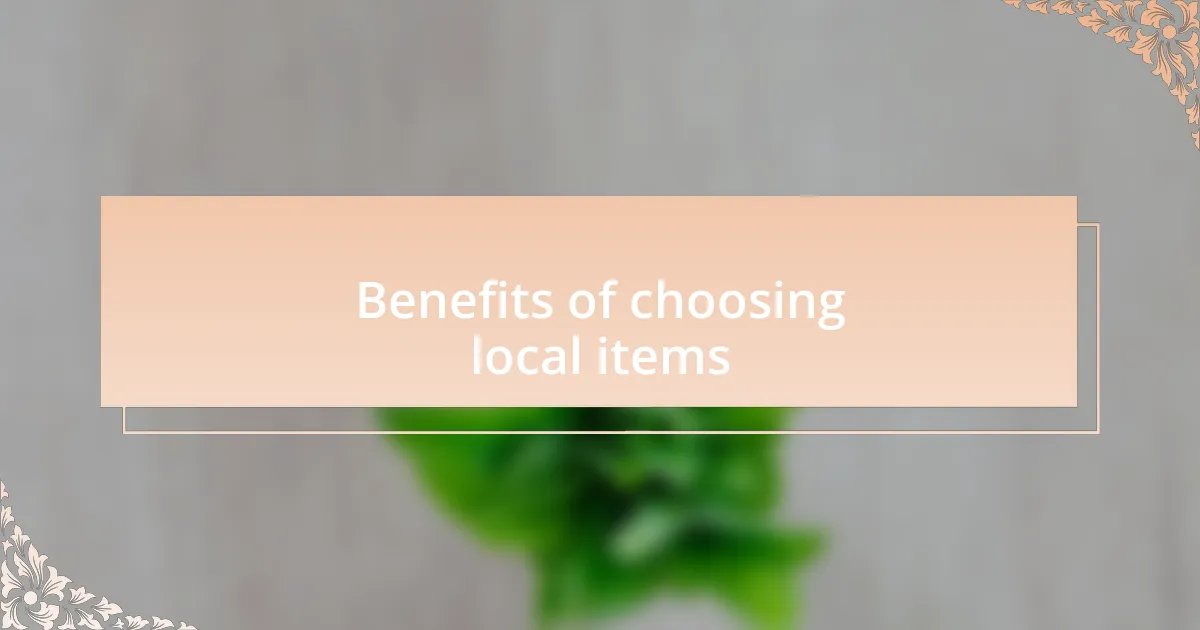
Benefits of choosing local items
When I began choosing local items, I was surprised by the fresh flavors and vibrant colors of the products. There’s something undeniably special about biting into a locally grown tomato compared to its grocery store counterpart. Each delicious slice reminded me of the farmers who pour their hearts into their work just down the road, making every meal feel like a celebration of our community.
Supporting local businesses also fuels the local economy, and this realization struck me during a weekend farmer’s market visit. I met a local baker whose passion for artisan bread was evident in every loaf. Buying from her not only meant enjoying fresh, handmade goods but also knowing my money was helping her family thrive. Isn’t it rewarding to think that our choices can directly uplift those around us?
Moreover, I’ve found that local items tend to have a smaller carbon footprint. When purchasing from nearby sources, I know I’m reducing the energy spent on transportation and storage. This awareness adds a layer of satisfaction to my shopping experience. Have you considered how easy it can be to make a positive environmental impact with just a bit of intentionality in your shopping habits?
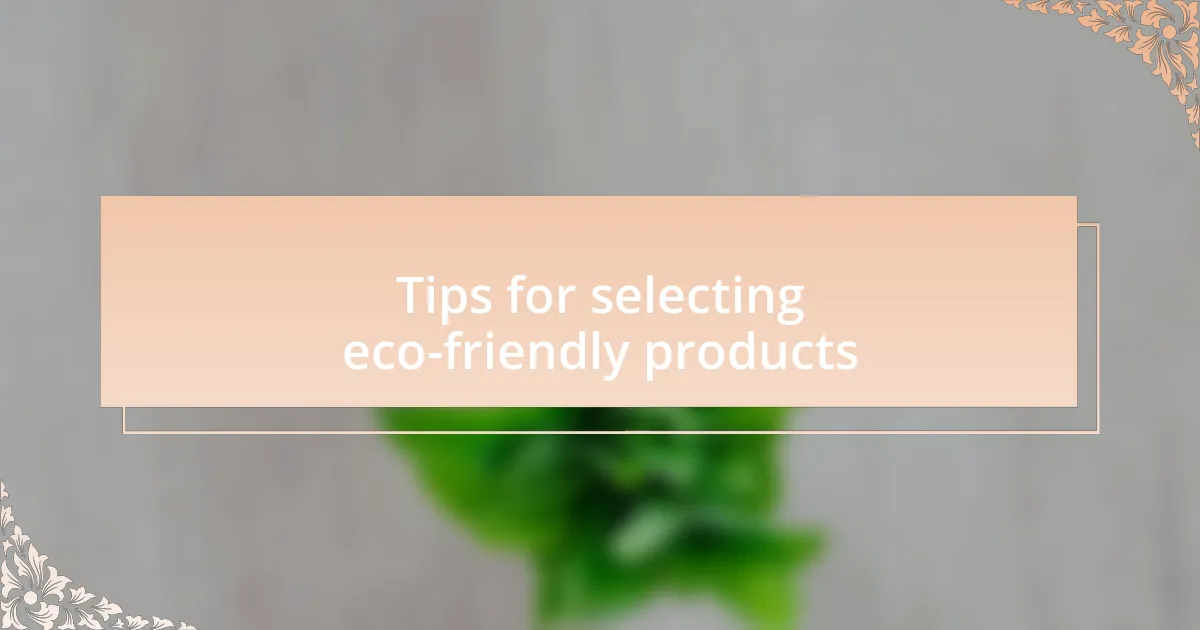
Tips for selecting eco-friendly products
When I shop for eco-friendly products, I always check for certifications like Fair Trade and USDA Organic. These labels give me confidence that the products adhere to high environmental standards. The first time I chose organic coffee, I could actually taste the difference; it felt good knowing it was grown sustainably and supported farmers that share my values.
I also pay attention to packaging, favoring items that use biodegradable or minimal materials. Recently, I switched to soap wrapped in paper instead of plastic, and it feels great to reduce my waste. Have you ever noticed how much unnecessary plastic we accumulate just from shopping? Choosing products with thoughtful packaging can really simplify our impact on the environment.
Lastly, I look for products that prioritize durability and longevity. I remember replacing my cheap kitchen utensils frequently, which only added to my frustration and waste. Now, investing in high-quality, lasting items not only saves me money in the long run, but it also aligns with my commitment to sustainability. Isn’t it empowering to know that each purchase can contribute to a healthier planet?
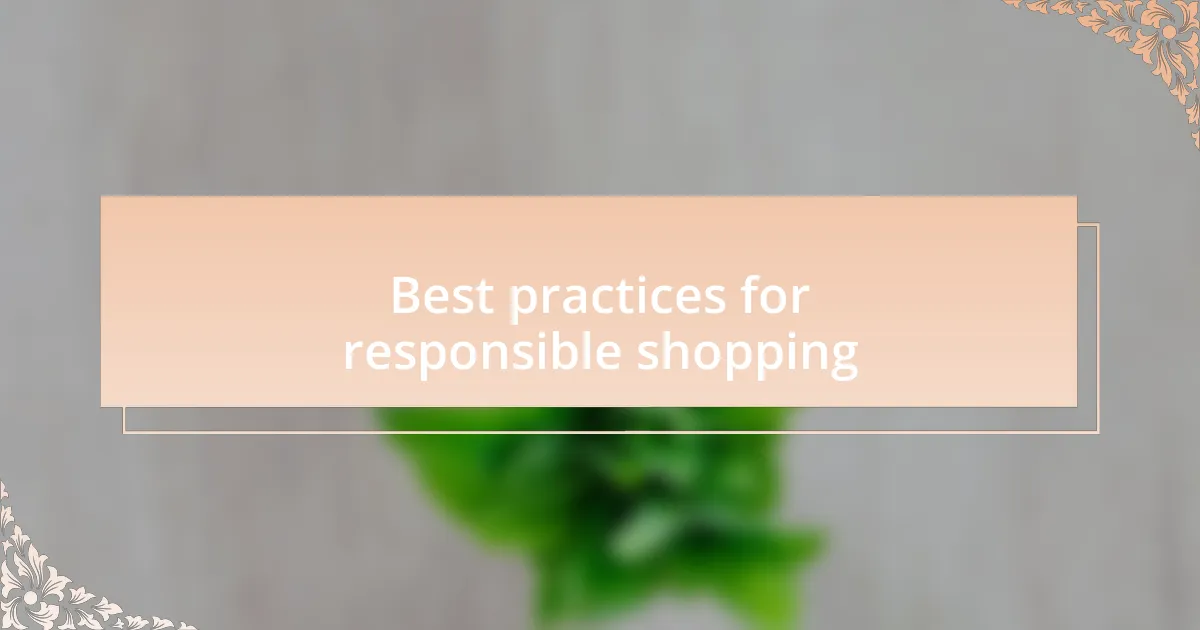
Best practices for responsible shopping
When it comes to responsible shopping, I’ve found that making a shopping list ahead of time can really help me stay focused. The first time I did this, I was amazed at how much it cut down on impulse buys. Isn’t it interesting how a little planning can lead to more mindful choices and less waste?
I also believe in supporting local businesses whenever possible. During a recent visit to a nearby farmer’s market, I met a vendor who shared stories about how he grows his produce sustainably. It felt wonderful to connect directly with someone who cares about the environment just as much as I do. Have you ever thought about how your shopping decisions can directly impact your community?
Lastly, I make it a point to educate myself about the brands I support. I remember feeling frustrated when I realized a brand I liked didn’t prioritize sustainable practices. Since then, I take the time to research and choose companies that align with my values, and it’s truly rewarding to feel like I’m part of a movement toward responsible consumption. How about you? Have you looked into the practices of your favorite brands lately?
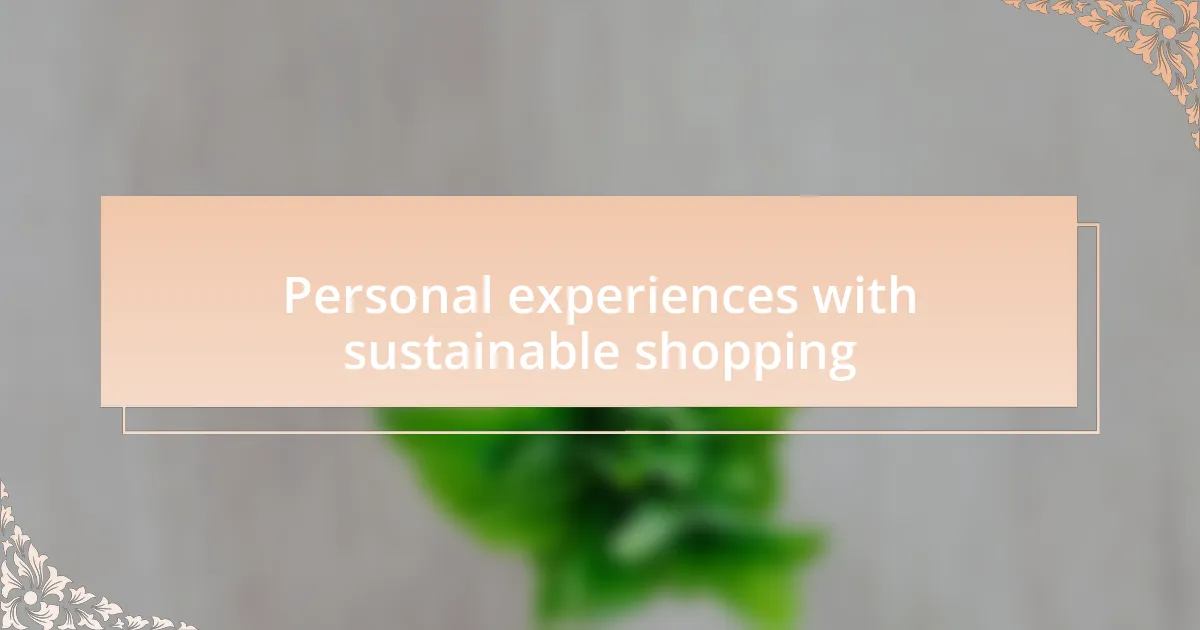
Personal experiences with sustainable shopping
Sustainable shopping has changed my perspective on consumerism entirely. One of my standout moments was when I decided to host a zero-waste party. I sourced everything from local thrift stores and ventured into bulk shops, which made me feel like a kid on a treasure hunt. Have you ever experienced that electric excitement while discovering unique, second-hand items that tell a story?
I vividly recall my first experience with buying organic clothing. I stumbled across a small boutique that specializes in ethically sourced materials. The price tag was higher than I was used to, but I left the store feeling a sense of pride knowing my purchase supported fair labor and minimized environmental impact. It made me wonder, what if more of us prioritized quality over quantity in our wardrobes?
Another valuable lesson came when I tried swapping instead of buying. A friend organized a clothing exchange, and seeing everyone excitedly share their previously loved items felt magical. It opened my eyes to a whole new way of shopping that fosters community and sustainability. Have you considered how swapping can not only refresh your closet but also make a positive environmental impact?